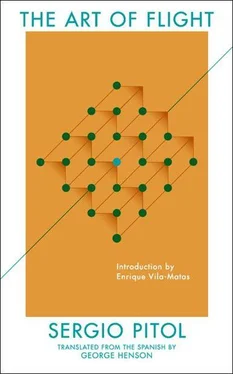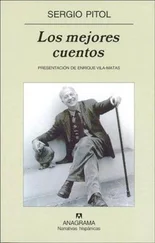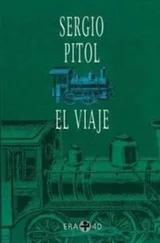Sergio Pitol - The Art of Flight
Здесь есть возможность читать онлайн «Sergio Pitol - The Art of Flight» весь текст электронной книги совершенно бесплатно (целиком полную версию без сокращений). В некоторых случаях можно слушать аудио, скачать через торрент в формате fb2 и присутствует краткое содержание. Год выпуска: 2015, Издательство: Deep Vellum, Жанр: Современная проза, на английском языке. Описание произведения, (предисловие) а так же отзывы посетителей доступны на портале библиотеки ЛибКат.
- Название:The Art of Flight
- Автор:
- Издательство:Deep Vellum
- Жанр:
- Год:2015
- ISBN:нет данных
- Рейтинг книги:5 / 5. Голосов: 1
-
Избранное:Добавить в избранное
- Отзывы:
-
Ваша оценка:
- 100
- 1
- 2
- 3
- 4
- 5
The Art of Flight: краткое содержание, описание и аннотация
Предлагаем к чтению аннотацию, описание, краткое содержание или предисловие (зависит от того, что написал сам автор книги «The Art of Flight»). Если вы не нашли необходимую информацию о книге — напишите в комментариях, мы постараемся отыскать её.
The first work in Pitol's "Trilogy of Memory," The Art of Flight imaginatively blends the genres of fiction and memoir in a Borgesian swirl of contemplation and mystery, expanding our understanding and appreciation of what literature can be and what it can do.
The Art of Flight — читать онлайн бесплатно полную книгу (весь текст) целиком
Ниже представлен текст книги, разбитый по страницам. Система сохранения места последней прочитанной страницы, позволяет с удобством читать онлайн бесплатно книгу «The Art of Flight», без необходимости каждый раз заново искать на чём Вы остановились. Поставьте закладку, и сможете в любой момент перейти на страницу, на которой закончили чтение.
Интервал:
Закладка:
11 SEPTEMBER
A month full of surprises and goings-on. I receive late payments from everywhere. I’m living in my new apartment, very much like a ship’s bow. Félix and Virginia came by to pick me up for dinner at the home of Beatriz and Óscar Tusquets. They’re about to start a new publishing house. I was delighted to meet them and have the opportunity to talk to them. They invited me to collaborate in their new endeavor. After a long conversation, we discussed and discarded various projects; in the end we agreed to create a new collection: The Heterodox, for writers and texts alike. They gave me their address, and as a first step in the collaboration they commissioned a translation of a selection of letters by Malcolm Lowry. That’s good news. First, I have to translate The Good Soldier by Ford Madox Ford, which Planeta commissioned a few days ago. It will appear in the collection Great Authors of Our Century . I can hardly believe that I’m living in this beautiful apartment, in such a pleasant neighborhood, sleeping on clean sheets, meeting such stimulating people, receiving so many offers of work. I close my eyes, see the dirty hippies, the ignoble streets, my squalid room, and the only thing that occurs to me is to quote a sentence from Galdós that María Zambrano used to repeat frequently: “The clouds moved and everything became a caricature.” I need to stick by my decisions, not to return to Mexico right now, forget England for the moment, and stay longer in Barcelona, and devote myself fully to publishing and to literature.
14 SEPTEMBER
Carmen Balcells held a boisterous reception in a luxury hotel for Max Aub, who, from what I’m told, has returned to Spain for the first time since his exile. The gauche divine showed up in force. I felt happy. Max introduced me to Carlos Barral, Castellet, Gil de Biedma, to everyone. Later a discussion with Azúa at Los Caracoles ended very bitterly. Federico Campbell arrived today from Rome, and we had a long, delightful conversation about mutual friends in Mexico and Italy. I authored five articles for Seix Barral. I became a member of the Council of Reading a few days ago. My novel, unfortunately, has been interrupted. A piece of news left me dumbfounded. My brother Ángel called from Mexico to tell me that Francisco Zendejas had published news of my death in Excélsior , to the obvious consternation of my family. Suddenly I’m frightened by the possibility that it might be an omen, so to cheer myself up I tell myself, and to a certain extent it works, that the person who died was a shadow that I barely recognize today, and who was a prisoner the entire summer in the Escudillers. After Ángel’s call I was so nervous that I went up to Myriam Acevedo’s apartment to have a cup of coffee. I mentioned, among other incidents from my past life, the encounter with the man in the bar who said he had met me in Switzerland. Something he said to me had a profound effect on her, something like, “Tell your company that I need an Argentine passport and for them to deliver twenty thousand dollars to me.” She insisted on knowing what company he was referring to. I told her twenty thousand times that I didn’t know, that that was what had frightened me, because it all had been a case of mistaken identity. Then out of the blue she asked me: “Do you know a spy? Are you sure that one of your friends isn’t a spy?” “I suppose so,” I told her. “Possibly in Warsaw or in Belgrade, or right here, people come up to me to try and find out what I think about the regime. But you can’t know if they are spies,” I said. “Yes, but one can find out. Examine your friends,” she added. And so on for a long while; I went down to my apartment with a greater sense of unease than when I left. Surely she and her husband must feel hounded by informants who want to know what they are doing in Spain, if they plan to return to their country, etcetera, and that must have her very neurotic. “Don’t talk about anything to anyone; you don’t know what kind of world you’re moving in,” was the last thing she said to me.
FRIDAY, 19 SEPTEMBER
I took a blood test just in case. “Everything’s perfect,” the doctor said, smiling. Amazing!
SATURDAY, 27 SEPTEMBER
I was finally able to finish the prologue to Nostromo. I situated it primarily in the political realm, which I believe to be the novel’s central theme. It’s a work of great unevenness. Conrad talks too much about Nostromo’s remarkable qualities, about his invincible influence on individuals and the masses; however, once he introduces him, he inflicts on him a monotonous tone, a pedantry that serves only as a prop. He appears pretentious and insipid, limited, capable of nothing but clichés. The love scenes, as is almost always the case in Conrad, seem to take place between cardboard figures. The “passionate” dialogues between Nostromo and Viola, in spite of the air of panpipes and tambourines that the author imprints on them, and perhaps because of that very thing, are less than flat. I dined last night with Beatriz and a group of her friends, writers, translators, theater people, all young, at Can Masana, and when she introduced me she commented to someone that I had lived in Peking. Lived in China? For most of them it’s next to impossible to obtain a passport to cross the French border. I mentioned in passing my disappointment; the climate I endured there for six years, the steps toward the Cultural Revolution, the fanaticism, the absolute intolerance. I said how after eight days traveling by train, upon arriving to Moscow, I felt as if I were in the middle of Babylon. To some of them it seemed like an exaggeration. When I told them that I had just lived for three months in Escudillers they were almost more surprised than by my stay in Peking; the atmosphere immediately became more relaxed. Fortunately, they must have thought they were not talking to an ideologue but with a mad man. Once again, I felt like a survivor. Boudou Saved from Drowning , I could have shouted; but I didn’t, so as not to seem pedantic.
The truth is I wouldn’t trade Barcelona for any city in the world.

3 Known as Escudellers in Catalan, Franco mandated the change of all Catalan street names during his dictatorship, hence Pitol would have known the street as Escudillers in 1968. Today, the street is once again known by its original Catalan name, Carrer dels Escudellers. —Trans.
A VINDICATION OF HYPNOSIS
Suddenly, during a pause in his monologue, Federico Pérez cautioned me not to become too lost in circumlocution. I should lay everything on the line, he said. I replied that I had already done that the very day I made the appointment by phone. I was trusting that his treatment by hypnosis, about which I had heard great things, would help me give up smoking. If I had gone into too many details at the beginning of my explanation, it was to clarify what my relationship with tobacco was and had been. I do not remember his exact words, but he did allude to the evasiveness and circumlocutions in my speech. He added that he thought it was a manifestation of insecurity, a defense mechanism behind which I was hiding. I do not know if the doctor’s intervention, his interruption and description of the structure of the story, which unbeknownst to me had become unnecessarily and painfully labyrinthine, was part of the treatment, an attempt to stimulate a particular reaction, the beginning of subjugation. I defended myself with literary arguments. I took refuge in the fact that my writing was fundamentally built on those devices. That is its visible expression. I feel incapable of describing any action, no matter how simple, in a direct way. I said that other writers were able to do that, which did not mean I was less competent than they. In my case, plain and naked exposition, without flourishes, without detours, without echoes or shadows, fatally diminishes the efficiency of the story, converts it into a mere anecdote; a vulgarity, when all is said and done. From the very beginning, what I had always done was scatter a series of points onto the blank page as if they had fallen there by chance, with no visible relationship between them; until one suddenly began to spread out, expand, sprout tentacles in search of others, and then the others would follow its example: the points would become lines running across the page to find their sisters, either to subordinate or serve them, until that initial group of solitary points morphed into an increasingly complex and intricate character, with gaps, creases, ironies, blurrings, and glaring darkness. That was my writing or, at least, the ideal of my writing. I could have added, but I restrained myself, that my exposition could be the reflection of a specific way of conceiving literature, or rather, that the apparent loss of direction in language had created in me a second nature from which I could not escape. To the extent that I did not know how to talk about anything, not even the weather, without detours, and that, in itself, had nothing to do with personal insecurity, as it is usually understood, but rather with a lack of confidence, abstract, of course, in the possibility of communication and persuasion in the ontological loneliness of being. The narrator who, as a rule, appears in my novels rehearses several starting points in the pursuit of a truth, a revelation, and in the effort will lose his way a thousand times, stumble constantly, and will maintain the pace with great difficulty between suffering hallucinations and sleepwalking, only in the end to declare himself defeated. He will come to know that absolutes do not exist, that there is no truth that is not conjectural, relative, and, therefore, vulnerable. But searching for it, no matter how ephemeral, partial, and inconstant it may be, will always be his objective. The narrator might be Sisyphus and Icarus at the same time. His only certainty is that along the way he might have touched a few strands in a marvelous and deplorable tapestry, obscured sometimes by ominous stains or by a sudden and immediate iridescence that, upon seeing it, gives meaning to his efforts.
Читать дальшеИнтервал:
Закладка:
Похожие книги на «The Art of Flight»
Представляем Вашему вниманию похожие книги на «The Art of Flight» списком для выбора. Мы отобрали схожую по названию и смыслу литературу в надежде предоставить читателям больше вариантов отыскать новые, интересные, ещё непрочитанные произведения.
Обсуждение, отзывы о книге «The Art of Flight» и просто собственные мнения читателей. Оставьте ваши комментарии, напишите, что Вы думаете о произведении, его смысле или главных героях. Укажите что конкретно понравилось, а что нет, и почему Вы так считаете.












